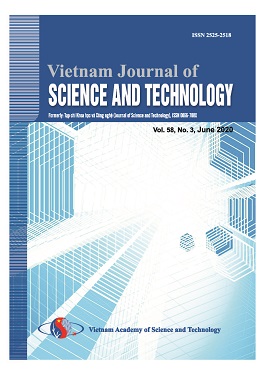Degradation of deproteinized natural rubber by Gordonia sp. isolated from enrichment consortia
Author affiliations
DOI:
https://doi.org/10.15625/2525-2518/58/1/14579Keywords:
isolation, deproteinized natural rubber, degradation, Gordonia sp.Abstract
Biodegradation is a potential way of decomposing deproteinized natural rubber (DPNR). The enrichment consortia were demonstrated from a rubber processing factor waste. Nine DPNR-degrading bacteria were isolated from those consortia. The highest DPNR film weight loss in a mineral salt medium (MSM) was 43.92 ± 2.30 % after 30 days incubation using strain 5A1. The formation of aldehyde group during rubber degradation of 5A1 was determined using Schiff staining and Fourier Transform Infrared spectroscopy (FTIR) analysis. The 16S rRNA gene sequence, of 5A1 showed the highest identity with that of Gordonia soli CC-AB07. This is the first report to demonstrate a strong ability to degrade DPNR by Gordonia sp.
Downloads
References
Mooibroek H., and Cornish K.- Alternative sources of natural rubber. Appl. Microbiol. Biotechnol. 53 (2000) 355–365.
Huber M.A., and Terezhalmy G.T.- Adverse reactions to latex products: preventive and therapeutic strategies. J. Contemp Dent Pract., 7 (2006) 97-106.
Tsuchii, A., Takeda, K., and Tokiwa, Y.- Colonization and degradation of rubber pieces by Nocardia sp. Biodegradation, 7, (1996) 41-48.
Linos, A., Steinbüchel, A., Spröer, C., and Kroppenstedt, R. M.- Gordonia polyisoprenivorans sp. nov., a rubber-degrading actinomycete isolated from automobile tire, Int. J. Syst. Bacteriol., 49, (1999), 1785-1791.
Linos, A., Berekaa, M. M., Steinbüchel, A., Kim, K. K., Spröer, C., and Kroppenstedt, R. M.: Gordonia westfalica sp. nov., a novel rubber-degrading actinomycete, Int. J. Syst. Evol. Microbiol., 52, (2002), 1133-1139.
Hiessl S., Schuldes J., Thurmer A., Halbsguth T., Broker D., Angelov A., Liebl W., Daniel R., Steinbuchel A.,- Involvement of two latex-clearing proteins during rubber degradation and insights into the subsequent degradation pathway revealed by the genome sequence of Gordonia polyisoprenivorans strain VH2. Appl Environ Microbiol 78(8) (2012), 2874–2887.
Berekaa M. M., Lino A., Reichelt R., Keller U., and Steinbuchel A.- Effect of pretreatment of rubbber material on its biodegradability by various rubber degrading bacteria. FEMS Microbiol. Lett. 184 (2000), 199-206.
Braga S. P., Santos, A. P., Paganini T., Barbosa D Epamino G. W. C., Morais C., Martins L. F., Silva A. M., Setubal J. C., Vallim M. A., and Pascon R. C.- First report of cis-1,4-polyisoprene degradation by Gordonia paraffinivorans. Brazilian Journal of Microbiology, 2019, https://doi.org/10.1007/s42770-019-00143-w.
Linh D.V., Huong N.L., Tabata M., Imai S., Iijima S., Kasai D., Anh T.K., Fukuda M.- Characterization and functional expression of a rubber degradation gene of a Nocardia degrader from a rubber-processing factory.Journal of Bioscience and Bioengineering,123(4) (2017) 412-418.
Kawahara, S.; Klinklai, W.; Kuroda, H.; Isono, Y.- Removal of proteins from natural rubber with ure. Polym. Adv. Technol. 15(4), (2004) 181-184.
Nawong C., Umsakul K., and Sermwittayawong N.- Rubber gloves biodegradation by a consortium, mixed culture and pure culture isolated from soil samples.Brazilian Journal of Microbiology, 49(3) (2018) 481-488.
Gallert C.- Degradation of Latex and of Natural Rubber by Streptomyces Strain La 7. System. Appl. Microbial. 23 (2000) 433-441.
Trang B.T., Linh D.V., Huong N.L., Anh T.K., Nghia P.T., Fukuda M.- Screening of natural rubber-degrading microorganisms from rubber processing factory waste in Vietnam. Internat. J. Waste Resources, 3 (2013) 9-12.
Hiessl S, Böse D, Oetermann S, Eggers J, Pietruszka J, Steinbüchel A.- Latex clearing protein an oxygenase cleaving poly(-1,4-isoprene) rubber at the cis double bond. Appl Environ Microbiol 80(2014) 5231-5240
Bosco F., Antonioli D., Casale A ,Gianotti V., Mollea C., Laus M., Malucelli G.- Biodegradation of unvulcanized natural rubber by microorganisms isolated from soil and rubber surface: A preliminary study. Bioremediation Journal, 22(1-2) (2018) 43-52.
Vidya T. V. and Growther L.- Biodegradation of rubber using actinobacteria isolated from rubber contaminated soil, Indian Journal of Environmental Protection, 37 (2017)1016-1025.
Andler R., Altenhoff A. L., Masing F., Steinbüchel A.- In vitro studies on the degradation of poly(cis-1,4-isoprene), Biotechnol Prog. 34(4) (2018) 890-899.
Linos A., Steinbüchel A. – Microbial degradation of natural and synthetic rubber by novel bacteria belonging to the genus Gordonia. Kautsch. Gummi Kunstst. 51 (1998), 496-499.
Linos A., Berekaa M.M., Reichelt R., Keller U., Schmitt J., Flemming H., Kroppenstedt R.M., and Steinbuchel A.- Biodegradation of cis-1,4-Polyisoprene Rubbers by Distinct Actinomycetes: Microbial Strategies and Detailed Surface Analysis. Applied and Environmental Microbiology, 66(4) (2000) 1639-1645.
Yikmis, M. and Steinbüchel, A.- Historical and recent achievements in the field of microbial degradation of natural and synthetic rubber, Appl. Environ. Microbiol., 78, (2012), 4543-4551.
Downloads
Published
How to Cite
Issue
Section
License

This work is licensed under a Creative Commons Attribution-ShareAlike 4.0 International License.
Vietnam Journal of Sciences and Technology (VJST) is an open access and peer-reviewed journal. All academic publications could be made free to read and downloaded for everyone. In addition, articles are published under term of the Creative Commons Attribution-ShareAlike 4.0 International (CC BY-SA) Licence which permits use, distribution and reproduction in any medium, provided the original work is properly cited & ShareAlike terms followed.
Copyright on any research article published in VJST is retained by the respective author(s), without restrictions. Authors grant VAST Journals System a license to publish the article and identify itself as the original publisher. Upon author(s) by giving permission to VJST either via VJST journal portal or other channel to publish their research work in VJST agrees to all the terms and conditions of https://creativecommons.org/licenses/by-sa/4.0/ License and terms & condition set by VJST.
Authors have the responsibility of to secure all necessary copyright permissions for the use of 3rd-party materials in their manuscript.







 Vietnam Journal of Science and Technology (VJST) is pleased to notice:
Vietnam Journal of Science and Technology (VJST) is pleased to notice: